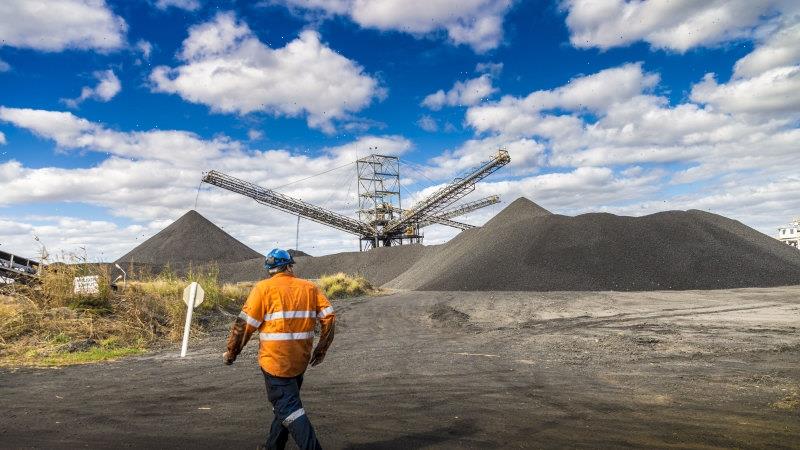Key points
- A Hunter Valley coal mine’s proposal to dramatically increase its output puts the NSW government’s environmental record on the line ahead of the state election.
- The plan aims to produce an additional 400 million tonnes of coal by 2050, which would result in a large leap in the volume of NSW’s annual emissions.
- Independent NSW MP Justin Field said it was difficult to take the government’s emission reduction targets seriously if new coal mining is approved.
A Hunter Valley coal mine’s proposal to dramatically increase its output has been condemned by critics who say it puts the NSW government’s environmental record on the line in the run-up to the state election.
The mine’s owners, Glencore and Yancoal, released an environmental impact statement (EIS) on Monday which outlines the proposed expansion and extension of the life of its Hunter Valley Operations (HVO) open-cut mine, which in 2020 produced 17 million tonnes of thermal coal.
The NSW government is considering nine coal mine projects, with environmentalists concerned they fly in the face of emission reduction targets. Credit:Glenn Hunt
If approved, the expanded mine would produce an additional 400 million tonnes of coal by 2050. The vast majority of this coal would be exported and burnt in overseas power plants and generate an additional 1.1 billion tonnes of greenhouse gases over the next 27 years, eight times the volume of NSW’s annual emissions.
Lock the Gate Alliance NSW co-ordinator Nic Clyde said the fact the NSW government was considering the project showed the country’s approach to emission reduction was ineffective.
“Unfortunately, the NSW government has a track record of backing new and expanded coal mining, and has failed to adopt policies to prevent coal mines from blowing NSW’s 2030 and 2050 emission targets,” he said.
“This year, the NSW government looks set to consider the most new and expanded coal mining capacity in the state since the Paris Agreement. This is an absurd position for a government that claims to have good climate credentials.”
The NSW government has announced a new target of reducing emissions by 70 per cent by 2035. The previous goal was a 50 per cent reduction by 2030.
Meanwhile, the federal government said it was open to approving new fossil fuel projects, even though it has set a legally binding climate target to cut emissions by 43 per cent by 2030, but the development’s economic and environmental credentials must stack up.
According to the United Nations’ chief climate body, the Intergovernmental Panel on Climate Change, to have a 50 per cent chance of remaining beneath 1.5 degrees just 2890 billion tonnes of carbon dioxide can be emitted. Of that amount, 2390 billion had already been emitted by 2019, leaving a pre-pandemic carbon budget of 500 billion tonnes.
If approved, the mine would contribute 1.26 million tonnes of carbon dioxide equivalent each year in scope 1 and 2 emissions – these refer to emissions used from construction and extracting coal, and count towards Australia’s greenhouse budget.
In comparison, greenhouse gas emissions in NSW were 136.6 million tonnes of carbon dioxide equivalent in 2019, representing 26 per cent of Australia’s total emissions. In 2021, Australia produced about 488 million tonnes of carbon dioxide equivalent.
But the vast majority of emissions generated by the Hunter coal will count against the emissions budget of countries where that coal is burnt, known as scope 3 emissions. The coal mine’s expansion is likely to produce 41.67 million tonnes of carbon dioxide equivalent in scope 3 emissions each year, or about 1.1 billion tonnes from 2023 to 2050.
Independent NSW MP Justin Field said it was difficult to take the government’s emission reduction targets seriously if new coal mining is approved.
“Since 2016, 26 new coal projects have been approved by the Coalition government. Another eight are likely to be considered in 2023 making who sits in the next parliament critical if these climate damaging projects are to be stopped.
“This should be a core issue for climate independents. All the evidence shows that under a Liberal-National Coalition more and more coal mining will be approved in NSW. We need strong independent voices who will put stopping these new coal projects front and centre if we have any hope of reaching net zero and doing our part to arrest the climate emergency”.
The Hunter Valley project is one of nine that are waiting on government approval. If given the green light, the mines could lead to the extraction of 600 million tonnes of coal.
A Labor spokesperson said they supported the independent processes which assessed resource proposals but would not comment further on the implication of the project on emission targets.
NSW Planning Minister Anthony Roberts and Glencore have been contacted for comment.
The Morning Edition newsletter is our guide to the day’s most important and interesting stories, analysis and insights. Sign up here.
Most Viewed in Environment
From our partners
Source: Read Full Article

